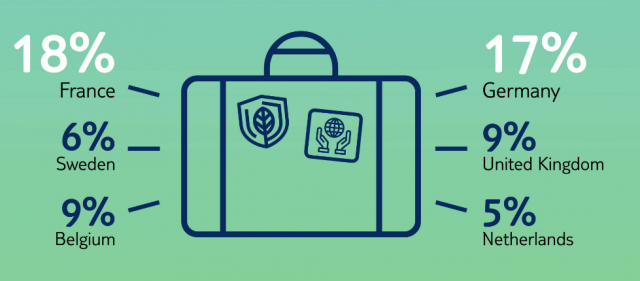
Eco-friendly travel is already very popular among many European holidaymakers – however, sustainable tourism also entails major challenges. This is the result of a global survey carried out by TUI Group. The representative survey among more than 3,000 respondents examined people’s attitude to sustainable travel in Germany, the UK, France, Sweden, Belgium and the Netherlands. They were people who had travelled in the past two years, not necessarily with TUI. It has shown that as many as one in ten European holidaymakers (eleven per cent) book eco- friendly hotels. German and French tourists show an above-average tendency to book sustainable accommodation, with 17 per cent of all German respondents and 18 per cent of all French TUI customers prefering eco-friendly hotels. No fewer than six per cent of Swedish and five per cent of Dutch customers follow this trend. In the UK and Belgium, nine per cent of customers prefer sustainable holidays.
“The survey shows that sustainable travel is in vogue among holidaymakers. This trend relates both to ecological and social sustainability. Sustainability factors that are becoming increasingly popular in the tourism sector include environmental protection, biodiversity, and better social standards for the local population in the destination. Two thirds of the respondents surveyed say that tour operators are responsible for offering sustainable holidays and should provide better information. This confirms TUI’s sustainability strategy, aimed at delivering 10 million greener and fairer holidays per year from 2020. The results of the survey should encourage the entire tourism sector to drive joint sustainability standards further ahead, based, among other factors, on sustainability certification for hotels such as the schemes recognised by the Global Sustainable Tourism Council,” says Thomas Ellerbeck, member of TUI’s Group Executive Committee and responsible for sustainability.
The survey has also identified current obstacles to greater sustainability in tourism. More than half of all respondents (55 per cent) criticise a lack of information and choice. Moreover, a large majority of 66 per cent of respondents believe that responsibility for sustainable travel primarily lies with the travel companies rather than themselves. In the customers’ view, tour operators should attach particular importance to offering fresh local or regional food products at hotels – and avoiding waste.
However, the survey findings have shown that sustainability has already found its way into the minds of holidaymakers. 84 per cent of respondents, for instance, consider it important to ensure that every individual contributes towards reducing the CO2 footprint of their trip. 68 per cent indicate they are prepared to make lifestyle trade- offs in order to benefit the environment in their everyday lives. The main motives shaping people’s fundamental attitudes to sustainability are environmental protection and animal welfare.
Compared with other nationalities, French, German and Belgian tourists show a particularly strong commitment to sustainability. Based on a broad range of questions related to sustainable behaviour such as recycling or energy saving, the survey has established a Sustainability Index measuring the commitment to sustainable behaviour. Three levels of engagement – low (e.g. trying to avoid food waste or save energy), medium (e.g. invest in energy-efficient appliances or prefer fair trade products when shopping), high (e.g. have installed solar panels, regularly donate money to environmental charities or book sustainable holidays). At 48 per cent, French respondents rank ahead of German and Belgian tourists with 41 per cent each in the high engagement group (UK: 32 per cent, Sweden: 38 per cent, The Netherlands: 33 per cent).
In 2015, TUI Group launched its sustainability strategy “Better Holidays, Better World 2015-2020”. It will be anchored at all levels of the Company by 2020. One of its goals is to deliver ten million greener and fairer holidays per year. TUI will also operate Europe’s most carbon-efficient airlines and reduce the carbon intensity of its business operations by 10% by 2020. In addition, the annual volume of investments in charity projects will be increased to ten million euros per year by 2020 with the support of TUI Care Foundation.





